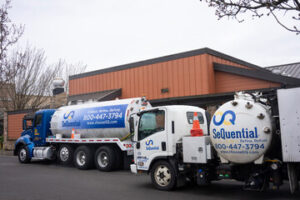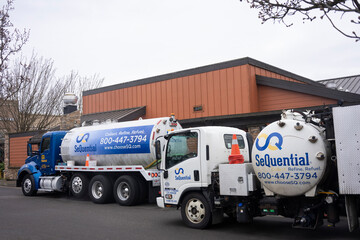Cooking oil that’s poured down drains can gel and block up sewer pipes, causing costly repairs. It can also cause foul odors in restaurants and homes.
Used cooking oil can be recycled into biodiesel, a renewable and clean-burning fuel that reduces greenhouse gas emissions. Many restaurants have cooking oil recycling programs. For more details on how to dispose of your used cooking oil, click here at https://www.septictankarmadale.com.au/.
 Recycle
Recycle
Used cooking oil can be recycled for several uses. It can be repurposed into non-stick cooking tools, soap, and more. It can also be composted. Cooking oil can be used to clean cars and remove tough dirt that is stuck to the surface. This is because of the high amount of fatty acids found in it. It can be mixed with lye to make laundry soap that is gentle on the skin. It can also be used as a natural insect repellent. Using recycled cooking oil is a great way to help reduce waste, conserve resources, and support a greener future.
Many restaurants and food service businesses use cooking oil to prepare meals. However, once the meal is finished, they often neglect to properly dispose of the used cooking oil. The wrong disposal methods can lead to clogged drains, which require costly plumbing repairs and can result in fines from local health inspectors or city sewer departments. To avoid these issues, restaurants should work with a professional to recycle their cooking oil and grease.
The best way to dispose of used cooking oil is to allow it to cool before pouring it into a container for disposal. It should be placed in a sturdy, leak-proof plastic or metal container. This bin should be emptied regularly to avoid overflow and a greasy mess that can clog kitchen drains and pollute nearby waterways.
It’s important to note that used cooking oil should never be poured down a sink or toilet. This can clog pipes and cause a blockage that can affect other buildings in the area. It’s also important to not add oil to a septic system, as this can cause major damage and pollute the surrounding water supply.
The easiest way to dispose of used cooking oil is to recycle it. This is a much better option for the environment and your business’s plumbing. A reputable used cooking oil recycling company will take the oil and turn it into other commercial products, such as animal feed, food-safe lubricants, or renewable biofuel. In addition, they will also provide a rebate for your restaurant or business.
Donate
Most municipalities have codes that restaurants must follow to ensure the proper storage and disposal of used cooking oil. Failure to do so can lead to expensive fines and even the closing of your establishment. Rather than throwing your old cooking oil away, work with a professional who offers cooking oil recycling to have it recycled and repurposed. These professionals will take your oil and use it for a variety of uses, including being filtered and converted into biodiesel fuel that can be used in cars or to heat water and generate electricity. They also reuse vegetable oil by using it to kill weeds in your garden. This helps protect the natural environment and keeps your weeds under control.
Freeze
Cooking with oil is a delicious way to prepare meals, but disposing of used cooking oil can be a messy and dangerous process. When done improperly, it can contaminate waterways and cause other health problems for people and wildlife. Fortunately, there are several ways to properly dispose of cooking oil, including reusing, blending, and recycling. When preparing to dispose of used cooking oil, it is important to keep in mind that the oil should be completely cooled before handling or throwing it away. It should also be stored in a sealable container, such as a plastic take-out box or an empty milk jug.
One option for reusing cooking oil is to recycle it as biodiesel. This is achieved by running the filtered cooking oil through a chemical conversion process. It can then be blended into diesel fuel and used for transportation. In some cases, it is also used as a substitute for weed killer, as cooking oil contains the same chemical compounds as many common insecticides.
Another option is to dispose of the used cooking oil by mixing it with a fungicide or herbicide. This can be applied to the soil around infested plants to help rid them of pests. Cooking oil can also be mixed with a nutrient to create a natural fertilizer for gardens and other green spaces.
If you decide to throw away the cooking oil, it should be poured into a sealed and marked container before being put into a garbage can or recycling bin. It is important to never pour the oil down a drain, as this can clog up your home or local plumbing system. Additionally, it should not be poured out in the backyard, as it may contaminate the soil and water supply.
It is also important to work with a company that provides professional used cooking oil (UCO) pick-up services. These companies ensure that cooking oil is handled correctly from before use until it is picked up and disposed of. This helps to improve the efficiency of restaurant kitchens and reduces the environmental impact. If you are interested in learning more about this service, contact your local oil collection service provider by phone or online form to find out how we can help with your UCO disposal needs.
Throw
Using the right method of cooking oil disposal is important to protect your establishment, as well as the natural environment. While it may seem tempting to pour leftover oil down the drain, this is a huge no-no and can cause major plumbing issues. Instead, cooks should allow the oil to cool and then pour it into a container that can be sealed away. Then, the oil should be taken to a drop-off point that accepts used cooking oil. Many municipalities have designated days for this, which can also help keep the oil from clogging sewers and other plumbing fixtures.
Another option for storing and disposing of used cooking oil is to work with a professional who will recycle it. These companies will collect the grease and cooking oil regularly from your establishment. They’ll then use it to create biodiesel fuel, which is a greener alternative to petroleum diesel.
This is the safest way to dispose of used cooking oil, as it prevents the oil from contaminating groundwater and other water supplies. It also helps to reduce your establishment’s waste load, which is good for the environment.
Many restaurant owners find that working with a company that provides grease and cooking oil recycling services is a great solution. This company will pick up the grease regularly and then take it to a certified facility for recycling. This method is the most environmentally friendly and can also save your establishment money on disposal costs.
In addition to finding a local professional, you can also check with your municipality to see if there are any community-used cooking oil recycling programs. These programs will have trucks that come to your establishment on a scheduled basis and pick up the cooking oil for recycling. This is a great option for large restaurants that produce a lot of used cooking oil.
Finally, you can always throw away your used cooking oil in the trash if it’s no longer usable or has gone rancid. But, if you go this route, be sure to use a sealable container and put it in the garbage on a non-draining day. Don’t throw it down the drain, or in your yard or bushes, as this will pollute the natural environment.
